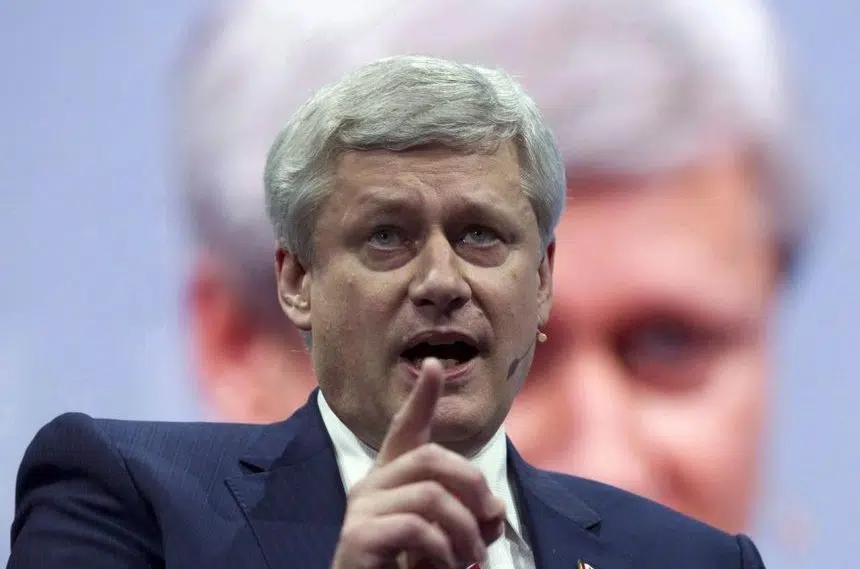OTTAWA — Suddenly, Stephen Harper is turning up everywhere.
In the past couple of weeks, he’s made headlines for writing a book, telling an American audience in February he could still “easily” lead the Conservative Party and for adding his name to a full-page ad in the New York Times praising President Donald Trump’s withdrawal from the nuclear deal with Iran.
On Monday he was in Montreal to mark Israel’s 70th birthday and Tuesday he tweeted he was pleased to be back in “la Belle Province”, adding it was great to see one-time colleagues including former Conservative MPs Denis Lebel and Christian Paradis and Conservative Sen. Leo Housakos.
Harper’s re-emergence bodes well for the Liberals’ strategy to brand the Opposition as “Harper Conservatives.”
For their part, the Conservatives seem to be saying: Bring it on. They’re not hesitating to embrace their former introverted leader who left the party with 99 seats and mixed emotions.
In some parts of the country, there is still antipathy towards Harper, and the Liberals are trying to stoke those negative opinions, said Tim Powers, a Conservative strategist and vice-chairman of Summa Strategies. On the other hand, “hardcore Conservatives will love it,” he said.
Powers said the Liberal strategy “makes sense” because Harper is visible.
Whether that’s deliberate or not, it might help the Liberals a little bit.”
Still, Scheer “can’t be looking over his shoulder for the ghost of Stephen Harper,” he added.
While Harper’s re-emergence seems to be coinciding with the Liberal branding exercise, he’s been active in global commentary and events since leaving office, said Rachel Curran, Harper’s former director of policy who currently works as a senior associate with Harper and Associates Consulting.
Curran said the Liberal attempt to paint Scheer and Harper with the same brush won’t hurt the Conservatives because Harper left the party in a strong position. She said if Scheer is able to build on that in 2019, the party will be in good shape.
As for whether Harper is looming over Scheer, Curran said there’s room for both of them.
“I don’t think Stephen Harper has to disappear entirely to make room for Andrew Scheer. Similarly I think Andrew Scheer has done a good job at putting his stamp on the party and developing his own policy direction certainly without any help from Mr. Harper.”
Curran said when the Liberals label Scheer’s party as “Harper Conservatives” it’s because they want to re-fight the 2015 election.
“Given the number of times they’re now referring to Stephen Harper in question period and elsewhere, it’s clearly a strategic decision.”
Many Conservatives allege the Liberals have polling numbers that show they need to attract or keep voters who could be tempted to vote NDP — and that’s what is motivating the strategy.
Since the Liberal convention in April, Prime Minister Justin Trudeau and Liberal MPs following his lead have been persistent in linking Scheer and Harper as cut from the same cloth.
“And if there’s one thing — and there may be only one thing — we’ve learned about the Conservative party under Mr. Scheer’s leadership, it’s this: It may be Andrew Scheer’s smile. But it’s still Stephen Harper’s party,” Trudeau said at the convention in Halifax.
At the same time, Harper has seemed to be “popping his head out of the gopher hole” as long-time Liberal Susan Smith, co-founder of Bluesky Strategy Group, describes his re-emergence.
Harper’s remarks to the Stanford Graduate School of Business in Stanford, Calif., which have been posted on YouTube, was the subject of a Liberal party fundraising blast Monday entitled: “Stephen Harper as leader?”
“Andrew Scheer may be the Conservative leader today, but it’s still Stephen Harper’s party,” the email said.
Smith called Harper’s re-emergence a “tremendous challenge” for Scheer, who has yet to put an imprint on the party and has not distanced himself from the Harper years.
“The more Harper speaks, the worse it is for Scheer.”
If Scheer distances himself from Harper, he risks alienating people in his party who like Harper, but if he fully embraces his old boss, it may alienate moderates the party hopes to attract, Smith said.
“In terms of the Liberals working on that narrative, I actually think that works. In 2015, voters said, ‘No thank you’ to Stephen Harper, so if the option being presented is Harper-lite or Stephen Harper with a smile, I think the odds are high they’ll likely say, ‘No thank you’ yet again,” said Smith.
Janice Dickson, The Canadian Press







